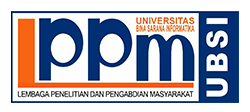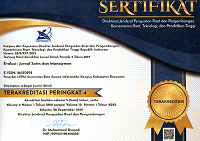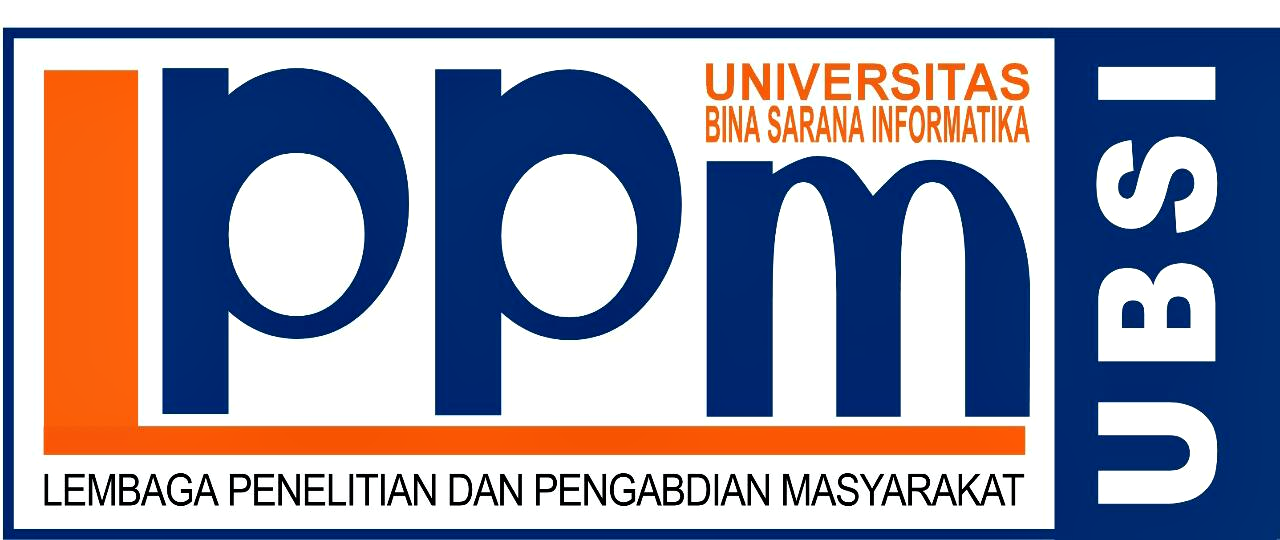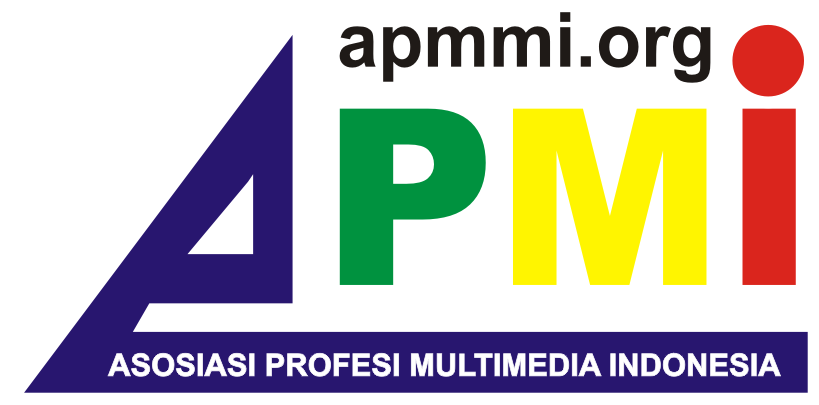Optimalisasi Algoritma Random Forest Menggunakan SMOTE untuk Prediksi Pembatalan Tamu Hotel
Abstract
Full Text:
PDF (40-51)References
Antonio, N., Almeida, A. de, & Nunes, L. (2017). Predicting hotel booking cancellations to decrease uncertainty and increase revenue. Tourism & Management Studies, 13(2), 25–39. https://doi.org/10.18089/tms.2017.13203
Arisandi, R. (2023). Perbandingan Model Klasifikasi Random Forest Dengan Resampling Dan Tanpa Resampling Pada Pasien Penderita Gagal Jantung. Jurnal Gaussian, 12(1), 136–145. https://doi.org/10.14710/j.gauss.12.1.136-145
Azhar, Y., Mahesa, G. A., & Mustaqim, Moch. C. (2021). Prediction of hotel bookings cancellation using hyperparameter optimization on Random Forest algorithm. Jurnal Teknologi dan Sistem Komputer, 9(1), 15–21. https://doi.org/10.14710/jtsiskom.2020.13790
Berrar, D. (2018). Cross-validation. Dalam Encyclopedia of Bioinformatics and Computational Biology: ABC of Bioinformatics (Vol. 1–3, hlm. 542–545). Elsevier. https://doi.org/10.1016/B978-0-12-809633-8.20349-X
Colcol, S. (2023). Hotel Cancellation Policy: Complete Guide.
Hartanti, D., Pradana, A. I., & Lestari, S. (2023). Komprasi Algoritma Decision Tree, SVM dan ANN untuk Reservasi Hotel (Vol. 16).
Imanwardhani, C. S. (2018). Pendekatan Synthetic Minority Oversampling Technique Dalam Menangani Klasifikasi Imbalanced Data Biner.
Jafar, J., & Rahaningsih, N. (2023). MENENTUKAN POLA RESERVASI HOTEL DENGAN ALGORITMA FP-GROWTH. JATI (Jurnal Mahasiswa Teknik Informatika), 7(1), 540–546. https://www.kaggle.com,.
Power, D. M. W. (2020). Evaluation: From Precision, Recall and F-Factor to ROC, Informedness, Markedness & Correlation.
Puh, K., & Bagić Babac, M. (2023). Predicting sentiment and rating of tourist reviews using machine learning. Journal of Hospitality and Tourism Insights, 6(3), 1188–1204. https://doi.org/10.1108/JHTI-02-2022-0078.
Roihan, A., Abas Sunarya, P., & Rafika, A. S. (2019). Pemanfaatan Machine Learning dalam Berbagai Bidang: Review paper. IJCIT (Indonesian Journal on Computer and Information Technology), 5(1), 75–82.
Santos-Pereira, J., Gruenwald, L., & Bernardino, J. (2022). Top data mining tools for the healthcare industry. Dalam Journal of King Saud University - Computer and Information Sciences (Vol. 34, Nomor 8, hlm. 4968–4982). King Saud bin Abdulaziz University. https://doi.org/10.1016/j.jksuci.2021.06.002
Selamet, I. W. A., & Sumadi, I. G. (2021). PERAN RESERVASI DALAM MENINGKATKAN PENJUALAN KAMAR DI TIJILI SEMINYAK HOTEL. Journey, 4(2), 321–340.
Suastini, N. M. (2018). ANALISIS MANAJEMEN RISIKO UNTUK MEMINIMALKAN DAMPAK FORCE MAJEURE DI THE RITZ-CARLTON, BALI. Jurnal Kepariwisataan, 17(3), 5–8.
Swana, E. F., Doorsamy, W., & Bokoro, P. (2022). Tomek Link and SMOTE Approaches for Machine Fault Classification with an Imbalanced Dataset. Sensors, 22(9). https://doi.org/10.3390/s22093246
Syahfitri, D., Perdana Windarto, A., & Fauzan, M. (2020). Peningkatan Nilai Akurasi Prediksi Algortima Backpropogation (Kasus: Jumlah Pengunjung Tamu pada Hotel berbintang di Sumatera Utara). Dalam Journal of Information Sistem Research (Vol. 2, Nomor 1).
Tanimoto, A., Yamada, S., Takenouchi, T., Sugiyama, M., & Kashima, H. (2022). Improving imbalanced classification using near-miss instances. Expert Systems with Applications, 201. https://doi.org/10.1016/j.eswa.2022.117130.
Wardani, D. M. (20221). Hotel Reservation Policy Pada Masa Pandemi : Refund, Rescedule Atau Cancel Di Labuan Bajo. Pariwisata, 8(1), 63–72.
DOI: https://doi.org/10.31294/evolusi.v12i2.23149
ISSN: 2657-0793 (online). ISSN: 2338-8161 (print)















